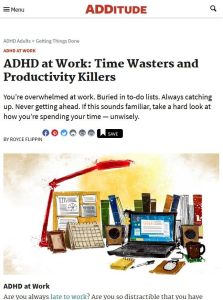
Royce Flippin
ADHD at Work
Time Wasters and Productivity Killers
Additude, 2019
What's inside?
Finding the right coping skills will help people with ADHD thrive in the workplace.
Recommendation
It’s hard to stay focused in a world of distractions. Resisting constant interruptions, however, is even harder for people suffering from attention deficit hyperactivity disorder (ADHD). Yet the condition doesn’t necessarily prevent those affected from succeeding at the workplace. Medical writer Royce Flippin provides hands-on advice for how people with ADHD can effectively manage their behavioral symptoms and make the most of their strengths. Indeed, the strategies he outlines can help anybody – with or without a diagnosed condition – to navigate the modern workplace more productively.
Take-Aways
- People with ADHD have a lot to contribute to the workplace yet often struggle to stay on top of their responsibilities.
- ADHD sufferers can implement a number of strategies to maximize their potential and minimize workplace difficulties.
- If you have ADHD, you are under no obligation to disclose your condition, but letting your employer know may help you get the support you need.
Summary
People with ADHD have a lot to contribute to the workplace yet often struggle to stay on top of their responsibilities.
People with ADHD find it hard to stay focused, are easily sidetracked by external and internal interruptions, and often come across as disorganized or careless. Low activity in the frontal area of the brain, which is responsible for prioritizing information and self-monitoring, is the likely cause of their symptoms.
“Adults with ADHD frequently excel in the workplace, once they adapt to their disability and develop coping skills.”
Many adults with ADHD, however, have gone on to lead successful careers – be it in entertainment, politics or business. People with ADHD often stand out for their people skills and creativity. The key for people with ADHD is to come up with individual coping skills to manage their condition.
ADHD sufferers can implement a number of strategies to maximize their potential and minimize workplace difficulties.
People with ADHD can manage their condition with a combination of medication and behavioral strategies. For one, ADHD drugs can help sufferers focus better and control their impulses. Yet, patients will need to time them properly to make sure the drugs don’t wear off while they are still at work. People with ADHD must develop appropriate workplace strategies – possibly with the help of an ADHD coach – to keep themselves on task. Some may find that working early in the morning, moving to a quiet workspace or letting phone calls go to voicemail helps minimize external distractions. Other strategies can help deal with internal interruptions: keeping a notepad handy to jot down random ideas for later, using a detailed planning system to have peace of mind that nothing important gets missed and making sure to stay engaged with work to minimize the temptation to daydream. Furthermore, setting a timer can help hyperfocused ADHD sufferers who easily lose track of their time. Taking advantage of every appropriate opportunity to move around in the course of the workday helps to manage hyperactivity. Finally, some may find it helpful to enlist a manager or co-worker to help them prioritize their work tasks and structure their day.
If you have ADHD, you are under no obligation to disclose your condition, but letting your employer know may help you get the support you need.
The traits that come with ADHD are often mistaken for character flaws – such as laziness or carelessness. Sufferers of ADHD may find more acceptance and understanding among co-workers who are aware of the situation.
“Ideally, by telling your boss, you’ll gain an ally in helping you to set up an optimal work environment.” ”
In the United States, employees with ADHD also benefit from a number of legal protections under the Americans with Disabilities Act, which covers the condition. US law doesn't require you to disclose your condition to your employer, but if you do, you can ask for a number of workplace accommodations that will help make your work life easier and more productive.
About the Author
Royce Flippin is a freelance health and medical journalist in New York City.
This document is restricted to personal use only.
My Highlights
Did you like this summary?
Read the articleThis summary has been shared with you by getAbstract.
We find, rate and summarize relevant knowledge to help people make better decisions in business and in their private lives.
Already a customer? Log in here.
















Comment on this summary